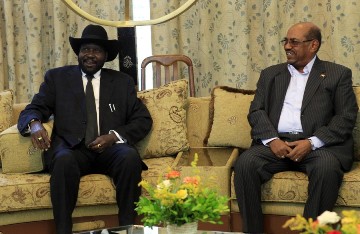Bashir-Kiir summit in Khartoum; new meeting but similar pledges
September 3, 2013 (KHARTOUM) – The Sudanese president Omer Hassan Al-Bashir vowed to his visiting counterpart from South Sudan Salva Kiir on Tuesday that the flow of oil through his country’s territory will continue “without any impediments” across flexible but secure borders.

Bashir was aggravated over what he claimed was continued support by Juba to the Sudan Revolutionary Front (SRF) which in April has extended its military reach to North Kordofan’s second largest town of Um Rawaba which took the government and observers at the time by surprise.
South Sudan rejects accusations of rebel support leveled by its northern neighbor and in turn alleges that Khartoum is aiding David Yau Yau’s rebellion in Jonglei state.
The Sudanese government has insisted that normal relations with South Sudan and implementation of cooperation agreements signed last year can only be attained after concluding security arrangements which in its core requires the establishment of a buffer zone and ceasing support to insurgents.
A joint commission comprised of African Union (AU) and Inter-Governmental Authority on Development (IGAD) is tasked with probing rebel support claims by the two countries.
Bashir emphasized the importance of ending rebel support in his open meeting with Kiir.
“The commitment to stop supporting and sheltering rebel movements is the most effective means in the process of confidence building between the two countries,” he said.
The Sudanese president said that his government is committed to immediate demarcation of the still-undefined borders and cooperating with the AU mediation team working on disputed border regions, determination of the zero centerline and monitoring of rebel support claims.
Kiir again reiterated his denial of harboring anti-Khartoum rebels but said he is willing to undertake steps that would alleviate Sudan’s concerns in this regard.
“We received accusations by Khartoum but according to the reality our country does not support opposition movements and does not provide them [with] shelter and I am ready to fulfill my promise in this regard and I do not wish to defend myself here,” the South Sudanese leader said.
He also urged the Sudanese government to open the borders and facilitate cross-border trade.
“It was Sudan that closed the borders unilaterally and we did not do [reciprocate] it..the people of South Sudan are waiting patiently for Sudanese traders to take to transport goods to consumers there,” Kiir said.
“I do not want these agreements to be on the books [only]; we will work to implement them fully and we are here for that,” he added.
On Abyei, the South Sudan president affirmed that his country wants resolution of the dispute on the basis of the AU proposal and urged Khartoum to do the same.
Abyei was supposed to hold a vote in January 2011 on whether its residents want to join north or south Sudan. The plebiscite was delayed over disagreements on who is eligible to vote between the pro-south Dinka Ngok tribes and the pro-north Misseriya tribe.
AU chief mediator Thabo Mbeki made a proposal last year which was approved by the African Union Peace and Security Council (AUPSC) to hold the referendum this October but excluding the majority of the Misseriya who spend few months in Abyei for grazing.
Khartoum swiftly rejected the plan and despite earlier blessings, the AU appears to have put its implementation on hold. The United Nations Security Council (UNSC) has yet to give a formal opinion on it.
Bashir on his end said that Sudan is determined to find a final solution that is satisfactory to all parties in Abyei that would ensure peaceful coexistence between the components of the local communities there “so as not to be a thorn on the side of relations between the two countries in the future”.
However, the two sides did not agree on the formation of local institutions in Abyei.
The two delegations pledged to work together with the international community on obtaining debt relief for the more than $40 billion in debt that has yet to be split following the formal secession of South Sudan in July 2011.
A Memorandum of Understanding (MoU) was signed to establish a joint council of businessmen from the two countries, some of who were part of Kiir’s delegation.
Sudan’s foreign minister Ali Karti told reporters that the visit will open the door to a new relationship between Khartoum and Juba to overcome the obstacles that have been affecting the relationship between the two countries .
“The atmosphere is suitable and we believe that President Salva Kiir came in good faith as we heard before the visit and during his speech during the welcoming of President [Bashir],” Karti said.
Karti, however acknowledged that a one-day visit is not sufficient to resolve all outstanding cases.
The South Sudan Undersecretary at the Ministry of Foreign Affairs and International Cooperation in Charles Manyang said that the two countries overcame the obstacles encountered in the implementation of the cooperation agreements.
“We as diplomats do not recognize obstacles and must move in the exchange of benefits, even if there are tensions in some cases,” Manyang told reporters.
The Sudanese Minister at the Presidency Idris Mohamed Abdul Qadir on his end said that “all the agreements signed we will proceed to implement immediately and we will work from this moment on to turn words into actions”.
During his visit, Kiir also held separate meetings with the leaders of the major political parties including Hassan Al-Turabi from the Popular Congress Party (PCP), the leader of the party Democratic Unionist Party (DUP) Mohamed Osman Al-Mirghani and head of the National Umma Party (NUP) al-Sadiq al-Mahdi, Sudan Communist Party (SCP) leader Mohamed Mokhtar Al-Khatib and head of the National Consensus Forces (NCF) opposition alliance Farouk Abu Essa.
(ST)
